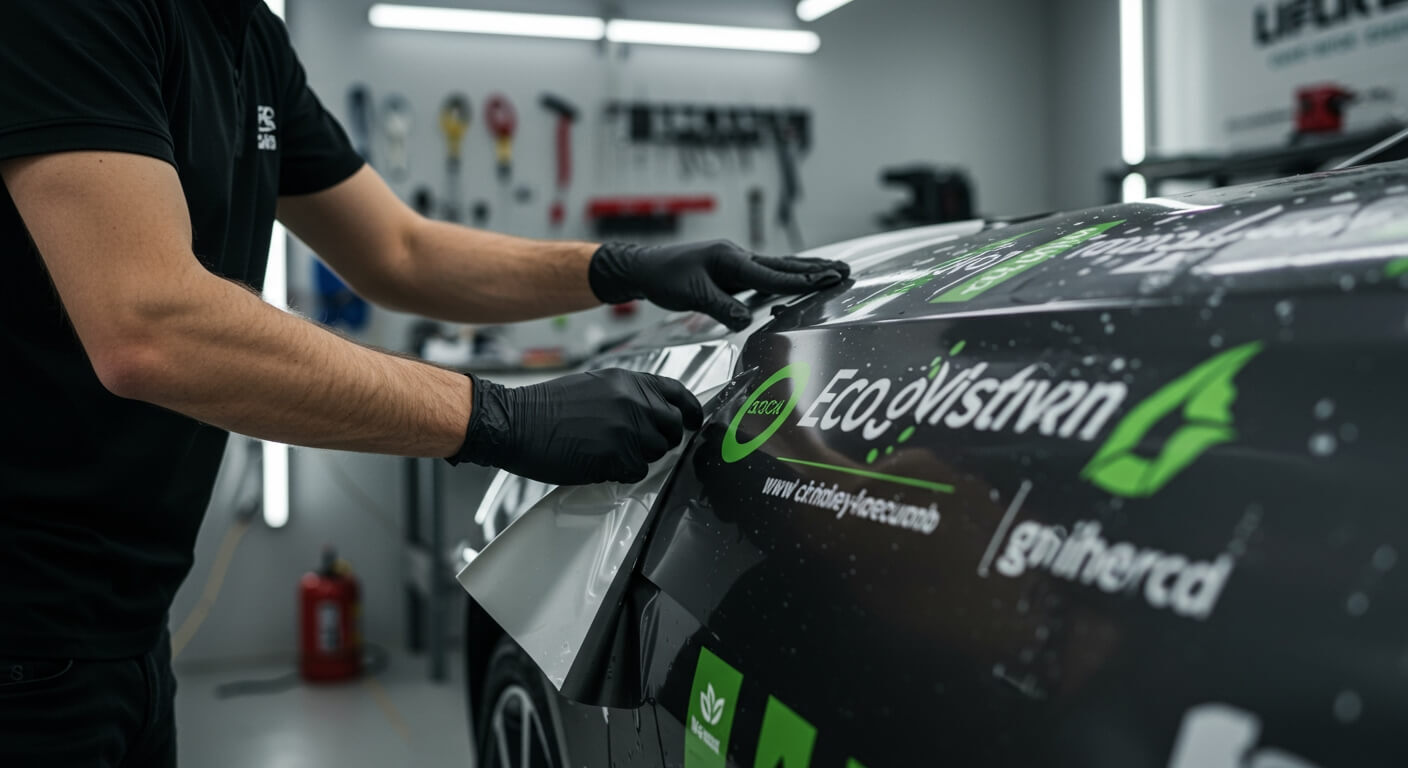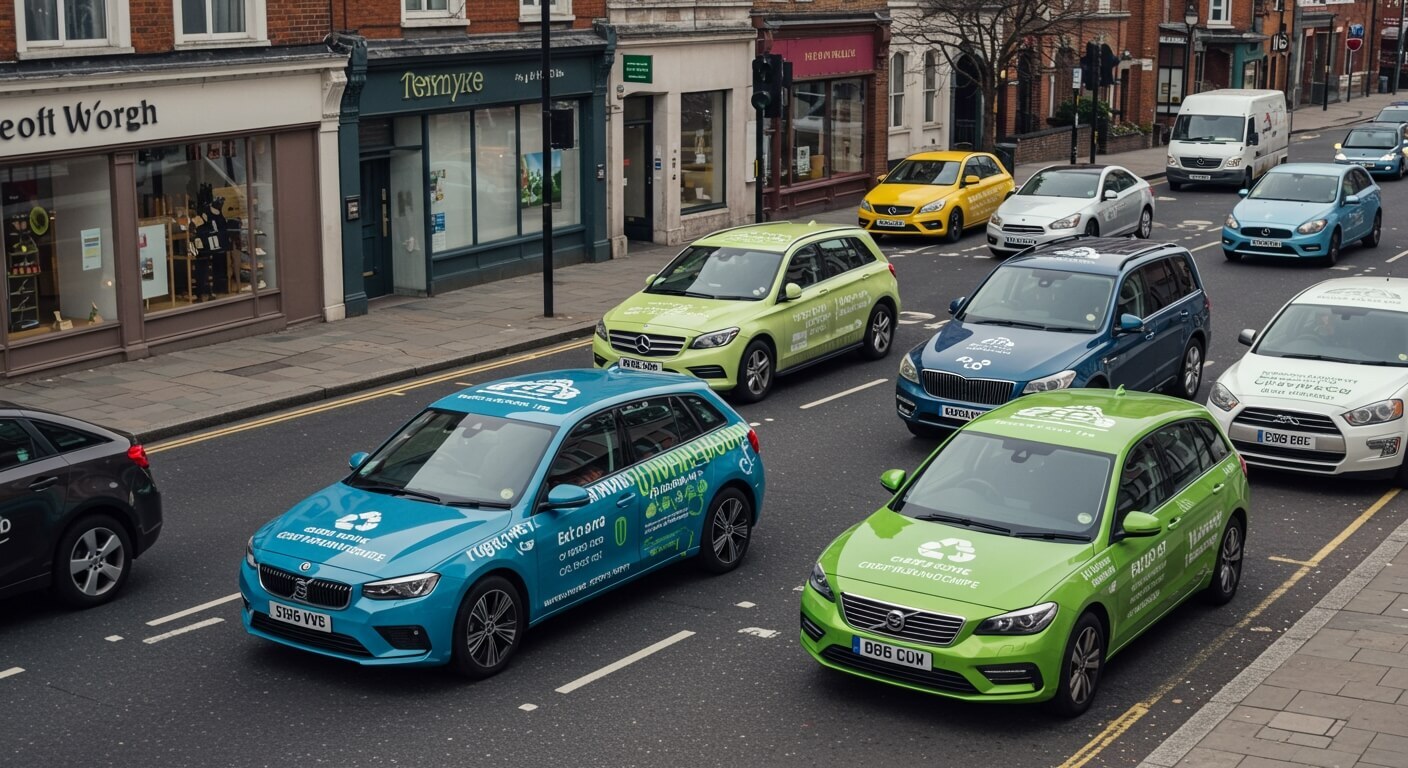Vinyl wrapping has become one of the most popular car styling methods in the UK. Many car owners choose wraps for personalization, paint protection, and easier maintenance. However, traditional wraps often raise questions about their impact on the environment. PVC films and chemical adhesives used in older wraps create waste and pollution. This concern is growing as more people in the UK shift towards greener lifestyles. In 2024, UK electric vehicle registrations grew by 17.8%, showing huge demand. This trend pushes demand for eco-friendly car wrap solutions, especially for electric and hybrid vehicles.
Understanding Vinyl Wrapping and Its Environmental Concerns
Vinyl wrapping means applying a thin film over the car’s painted surface. It provides colour change, branding, and paint protection without permanent changes. Wraps are popular because they are so flexible, reversible and cheap when compared to paint. Nevertheless, the conventional version of vinyl is usually made of PVC, which is linked to environmental worries. These wraps contain chemical adhesives that emit toxic substances in the atmosphere. Recycling is also a challenge, as the majority of wraps are non-biodegradable waste. Fleet owners and private users are now rethinking wrap options. TeckWrap’s calendered cut vinyl film guide highlights durable yet affordable solutions available today.

What Makes a Car Wrap Eco-Friendly?
A sustainable car or auto wrap avoids harmful plastics and uses recyclable materials instead. Newer options include pvc free car wrap films designed with less environmental impact. Many use water-based inks and non toxic auto wrap adhesives for safer installation. These films remove the risk of toxic fumes and reduce workplace hazards. UK surveys show that over 50% of drivers value sustainable auto solutions today. A green vehicle wrap helps align with lifestyle choices while lowering harmful emissions. People now want wraps that reflect eco-values, not just personal style preferences.
Common Environmental Issues with Traditional Vinyl Wraps
Older wraps have serious environmental concerns that businesses and drivers cannot ignore.
- High carbon footprint during vinyl production and transport
- Non-biodegradable waste after removal and replacement
- Disposal issues for fleet owners with large vehicle counts
These issues highlight why a biodegradable auto wrap or recyclable option is needed. Without sustainable options, wraps will continue adding to the UK’s plastic waste problem. Fleet operators, car owners, and designers now call for greener wrapping choices.
Sustainable Car Wrap Alternatives
Eco-focused solutions are slowly replacing harmful traditional wraps in the market. Bio-based wraps use natural inputs, lowering waste during production and disposal. Recyclable vehicle wrap materials like thermoplastic olefin (TPO) and PET are gaining popularity. These alternatives create less waste and allow better recycling compared to PVC wraps. Fleet owners of electric vehicles in the UK now prefer greener wraps. A low emission car or auto wrap supports brand values while protecting the environment. Wrap it green highlights EV vinyl wraps as strong solutions for future fleets.
Eco-Friendly Vehicle Wrap Designs
Designs also influence sustainability when planning a vehicle wrap. Eco-friendly vehicle wrap design focuses on reducing unnecessary printing and wasteful patterns. Minimal ink usage reduces carbon footprint and makes wraps easier to recycle later. Digitally printed wraps save resources while maintaining creativity and visual impact. Businesses increasingly choose lighter films for lower emissions and better fuel efficiency. Delivery fleets in the UK use green car wrap colours to promote sustainability. Matte greens and blues highlight environmental values and attract eco-conscious customers.
Benefits of Choosing Eco-Friendly Car Wraps
Choosing an environmentally friendly auto wrap brings several benefits for drivers and businesses.
- Lower carbon footprint compared to traditional PVC wraps
- Safer installation with non toxic vehicle wrap adhesives
- Helps businesses align with the UK government’s net-zero 2050 targets
- Long-term branding campaigns save costs with durable sustainable wraps
These benefits make an eco conscious auto wrap an excellent choice in today’s market. Many businesses use them to improve brand image and customer trust. Fleet operators also prefer eco-friendly wraps to support green delivery commitments.

Challenges in Adopting Sustainable Car Wraps
Despite benefits, there are challenges to using an eco-friendly vehicle wrap. Costs are higher because eco materials are newer and less available in bulk. UK market availability for biodegradable car wrap films is still very limited. Recycling systems for wrap removal are not yet strong across all regions. A stronger infrastructure is required to support growing eco-friendly automotive wrap alternative options. Businesses must plan around these issues while still supporting eco goals. For now, eco wraps remain niche but steadily growing in demand.
The Future of Eco-Friendly Auto Wraps
The future of automotive wrapping in the UK looks increasingly sustainable. With EV adoption growing fast, demand for environmentally friendly auto wrap options will rise. More research is happening to create fully recyclable and renewable car wrap material films. This innovation will make wraps both stylish and environmentally responsible. Industry growth predictions show a 7% rise annually, led by eco-conscious solutions. TeckWrap’s car wrap lifespan & care tips highlight sustainability with proper wrap maintenance. The future belongs to environmentally safe car wrap products, designed to meet rising eco demands.
Conclusion
Eco wraps are no longer optional; they are becoming essential in the UK. Drivers and businesses both want greener solutions that reduce environmental harm. Vinyl wrapping is shifting focus from style and marketing to sustainability and responsibility. Environmentally friendly films now balance creativity, protection, and eco-conscious practices. This change signals a new era for the UK’s car wrapping industry.
Check out TeckWrap UK’s wide range of eco-friendly car wrap solutions today. Explore Wrap It Green Blog for deep insights into sustainable auto solutions. Businesses and individuals can now adopt eco-friendly vehicle wrap options with confidence.
FAQs
Are vinyl car wraps recyclable?
Some wraps are recyclable, especially those using PET or non-PVC materials. Eco-friendly films improve this, offering better disposal solutions and reduced long-term waste problems.
What is the most sustainable car wrap material?
PET-based films and phthalate-free wraps are currently considered the most sustainable. These materials balance strength, recyclability, and durability while reducing reliance on harmful plastics.
Are biodegradable car wraps available?
Not widely available in the UK yet, but research is continuing rapidly. As demand rises, more suppliers will introduce new options for biodegradable and recyclable wraps.
How does an eco-friendly car wrap benefit businesses?
Businesses reduce carbon impact while building stronger sustainable branding. Customers also connect better with eco-conscious companies that invest in greener vehicle solutions.
Is a non-toxic car wrap safer to install?
Yes, low-VOC adhesives used in non toxic car wrap products are safer. They protect installers from harmful fumes while keeping applications environmentally safe.
